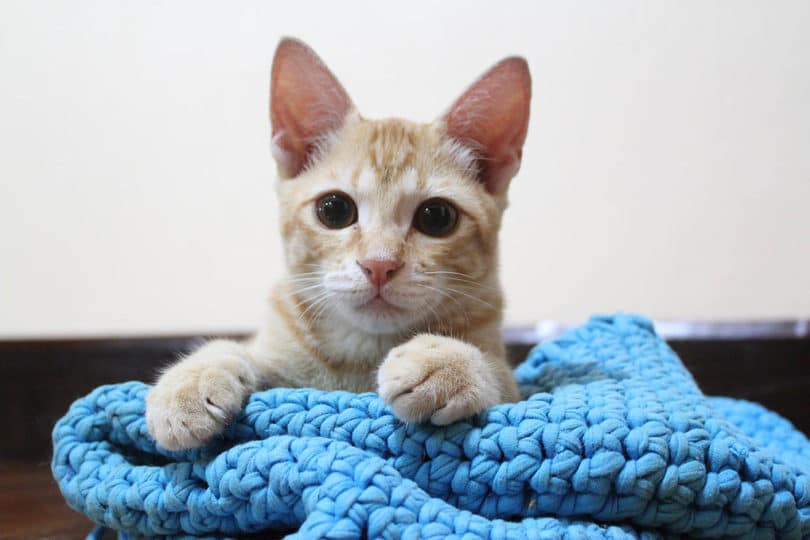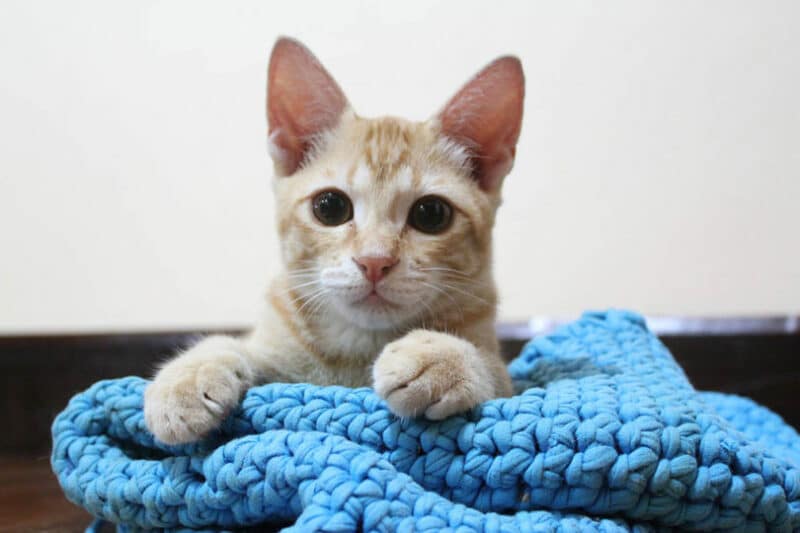If your cat needs a new bed and you have a few basic crochet skills, then you can create a new bed in a matter of hours! From classic shapes to fast beds in chunky yarn and even novelty options to make you smile, we’ve rounded up the 19 best cat bed patterns so you can pick your favorite. Your cat will thank you!
The 19 DIY Crochet Cat Beds
1. Classic Cat Bed
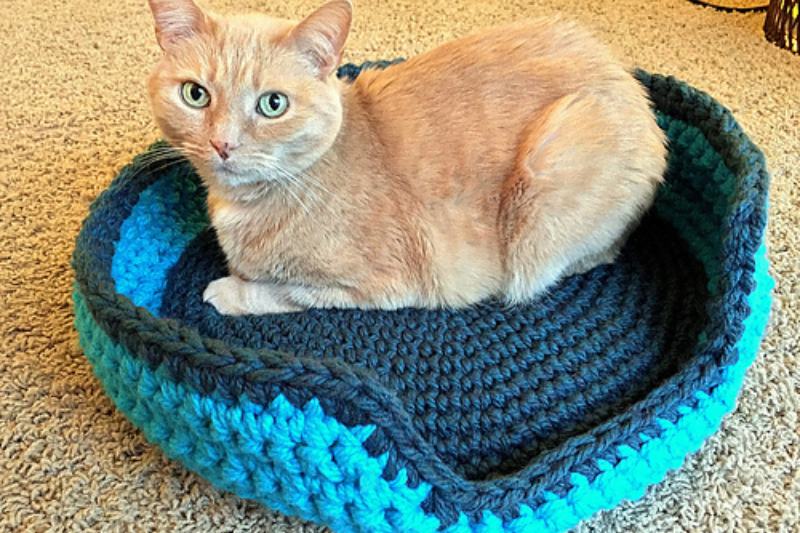
| Skill Level: | Beginner to medium |
| Materials: | Wool in the color of your choice, Soft padding for the base cushion |
| Tools: | Crochet hooks, Scissors, Embroidery needle |
If you’re looking for a classic, sturdy, and comfortable crochet bed for your cat, then this bed will soon become a firm favorite. It’s quick and relatively simple to make and is great for lounges or bedrooms where cats love to sneak off for a quick nap. You can make it in any color to match your home, and it’ll only take a couple of hours from start to finish.
2. Modern Cat Bed
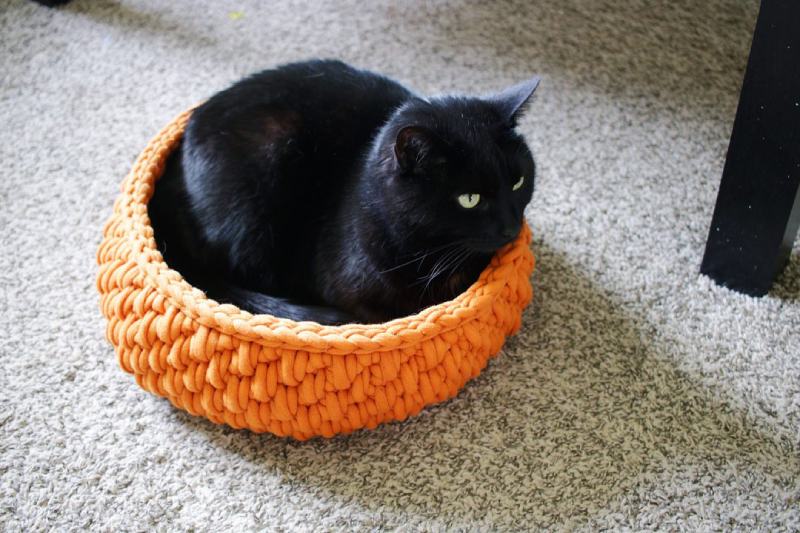
| Skill Level: | Medium |
| Materials: | Jumbo wool in the color of your choice |
| Tools: |
Crochet hooks, scissors, embroidery needle
|
This easy crochet cat bed with modern lines can be made in any color you like! The minimalist open design is perfect for cats who like to sleep with one eye open. As this pattern uses jumbo yarn, you might be surprised at how quickly it comes together — you’ll only need an hour to so before your cat is tucked up in their new bed!
3. Tabby Chic Cat Bed
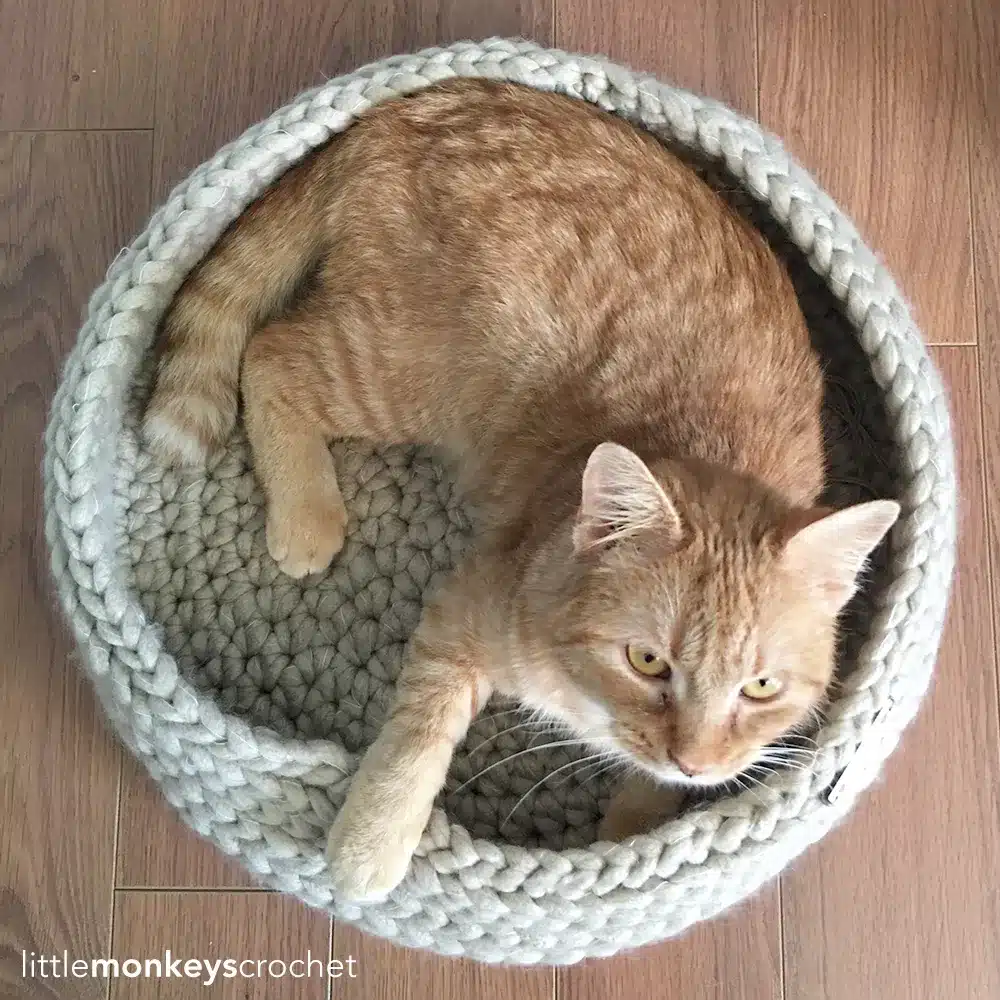
| Skill Level: | Easy |
| Materials: | Wool, tag |
| Tools: |
Crochet hooks, scissors, embroidery needle
|
Cat beds can take as many forms as the cats that sleep in them. Some cats prefer to be completely enveloped while they sleep and others prefer something a little more open plan. This tabby chic cat bed is like a large, soft cat bowl that will keep your cat snug and warm. The pattern is simple and while it does include a tag, yours doesn’t have to.
4. Animal Shelter Kitty Blanket
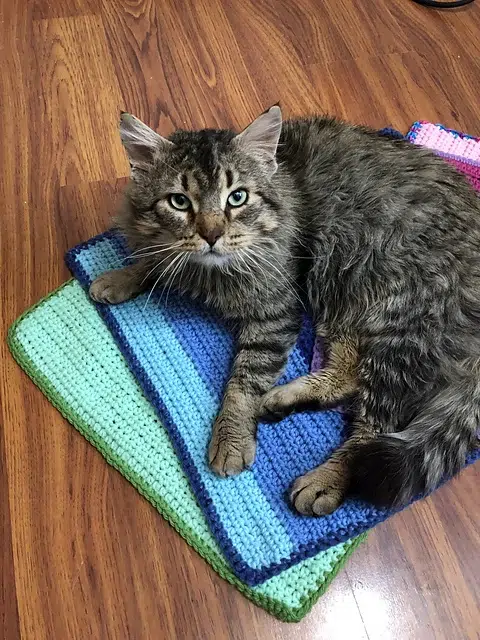
| Skill Level: | Easy |
| Materials: | Wool |
| Tools: |
Crochet hooks, scissors, embroidery needle
|
The animal shelter kitty blanket is a really easy design as it is just a blanket so is effectively just a flat crochet. However, it looks great, and the concept behind it is also lovely, with the crocheter encouraged to create one to gift to their local animal shelter. You can also make one for your own cat.
5. Crochet Cat Sack Hideaway
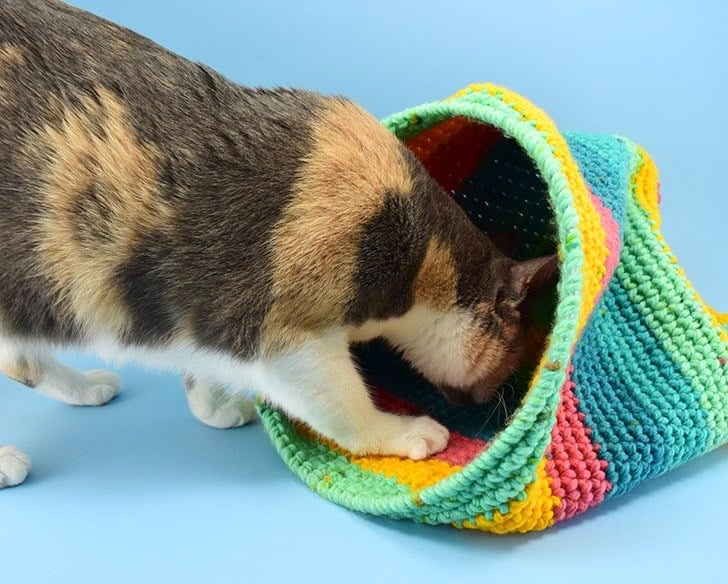
| Skill Level: | Moderate |
| Materials: | Wool |
| Tools: |
Crochet hooks, scissors, embroidery needle
|
The crochet cat sack hideaway is a great bed for those cats that like to sleep in their bed, rather than on it. Some cats like doing this because they appreciate the darkness and the respite. Others like the feeling of security and safety that it brings. Whatever the reason, this is a great and affordable alternative to an expensive cat cave.
6. Bernat Cat Nap Nest
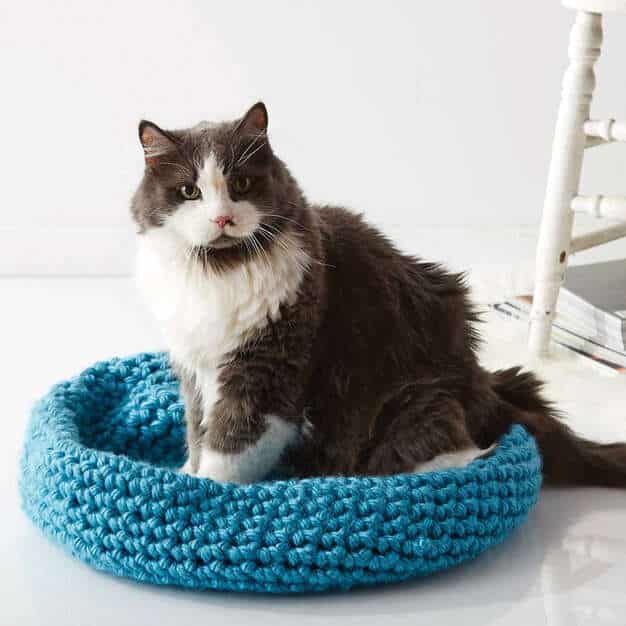
| Skill Level: | Easy |
| Materials: | Wool |
| Tools: |
Crochet hooks, scissors, embroidery needle
|
Cats aren’t particularly concerned with the color of their bed, and you can use any wool color you like with the Bernat cat nap nest, which means you can go as bold as you like. Or you can stick to something more neutral and in keeping with the rest of the room.
7. Skein Pet Bed

| Skill Level: | Easy/Moderate |
| Materials: | Wool |
| Tools: |
Crochet hooks, scissors, embroidery needle
|
The Skein pet bed pattern is actually two patterns. One is for a double-layer bed that is extra comfy and the other is for a single-layer floor mat. Floor mats are especially useful if your cat likes to be on ground level but you have a hard floor that tends to stay cold. As the pattern suggests, these are also good options for cats in shelters that may not have the same luxuries as rehomed cats.
8. Crocheted Cat Nest
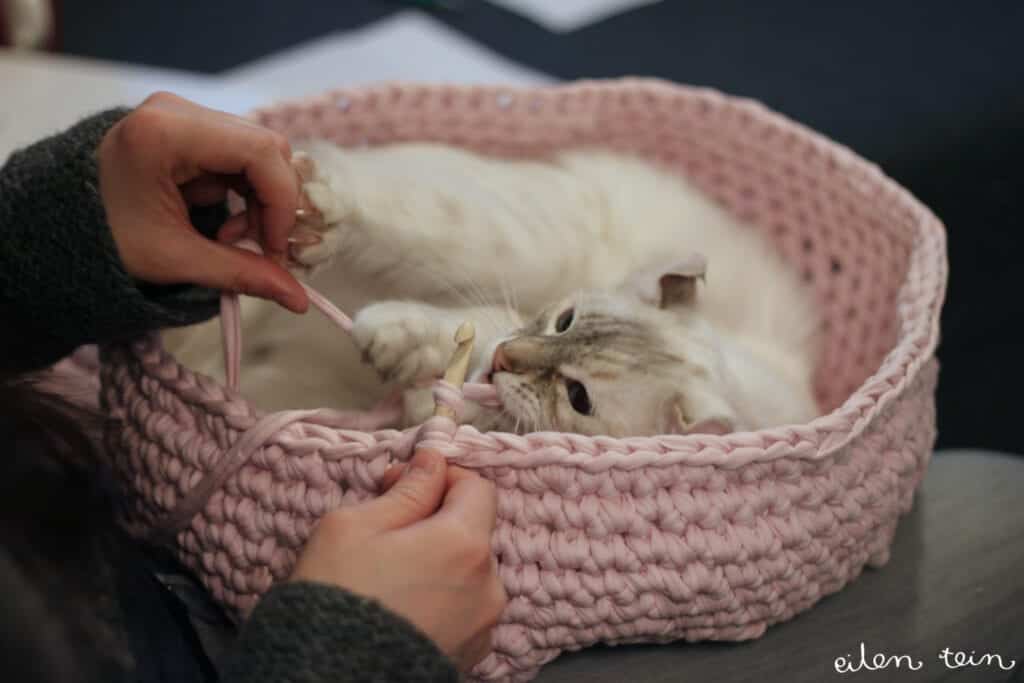
| Skill Level: | Moderate |
| Materials: | Wool |
| Tools: |
Crochet hooks, scissors, embroidery needle
|
Cat caves have become really popular. Not only are they warm and comfortable for the cats that are lucky enough to sleep in them, but they can also add a really homely look to a room. They can be a little expensive, though, especially if your cat then decides it would rather not sleep in it. This crocheted cat nest is a similar design to a cat cave, although called a nest, but you will need to use your browser’s translate feature to read the instructions.
9. Psy and Thai’s Kitty
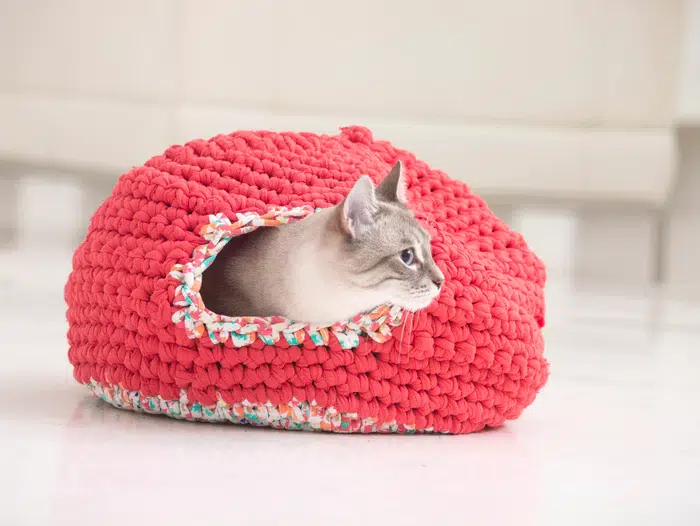
| Skill Level: | Moderate |
| Materials: | Wool |
| Tools: |
Crochet hooks, scissors, embroidery needle
|
This is another cat cave-style bed, called Psy and Thai’s Kitty pattern, but where this one differs a little is in the use of different wool to create the frame around the door and the base of the bed. The cave looks comfy and snug, too, so it is sure to appeal to cats.
10. Cat House
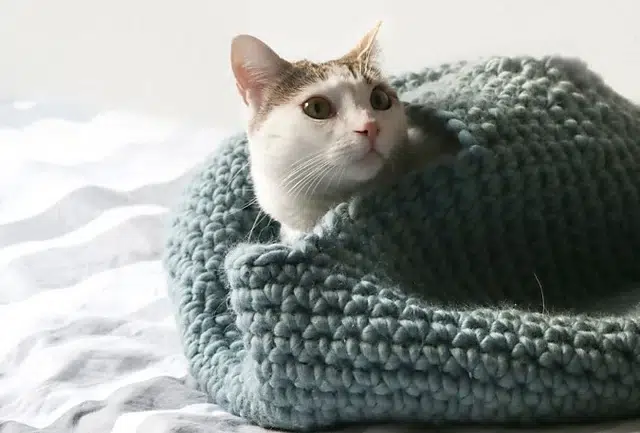
| Skill Level: | Easy |
| Materials: | Wool |
| Tools: |
Crochet hooks, scissors, embroidery needle
|
The crocheted cat house is like a cat cave except that it is a little less sturdy so the material will fold and fall on your cat. Not all cats will like this, but even if yours doesn’t, it may still use the house as a normal bed and sleep on top of it. If yours is a cat that likes to be covered while sleeping, it is sure to enjoy this cat house.
11. Easy Crochet Cat Bed
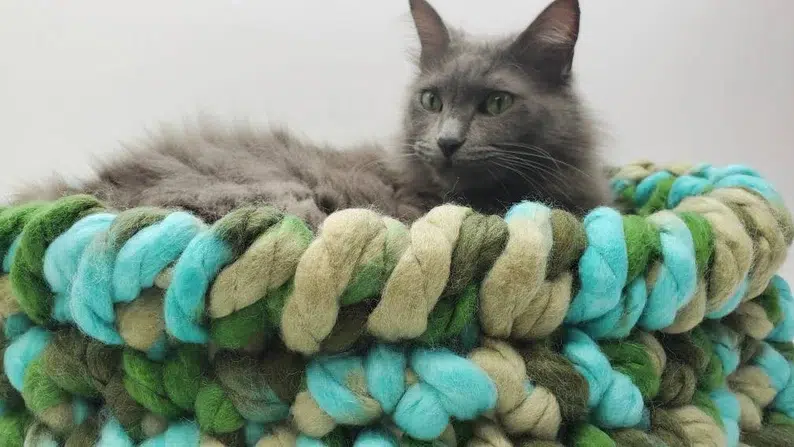
| Skill Level: | Easy |
| Materials: | Wool |
| Tools: |
Crochet hooks, scissors, embroidery needle
|
This easy crochet cat bed is a relatively simple design, but by using patterned wool, you can create something that looks truly unique and special. The thick wool creates quite a deep wall so the bed will help keep your cat warm even during the colder weather.
12. Rainbow Heart Cat Bed
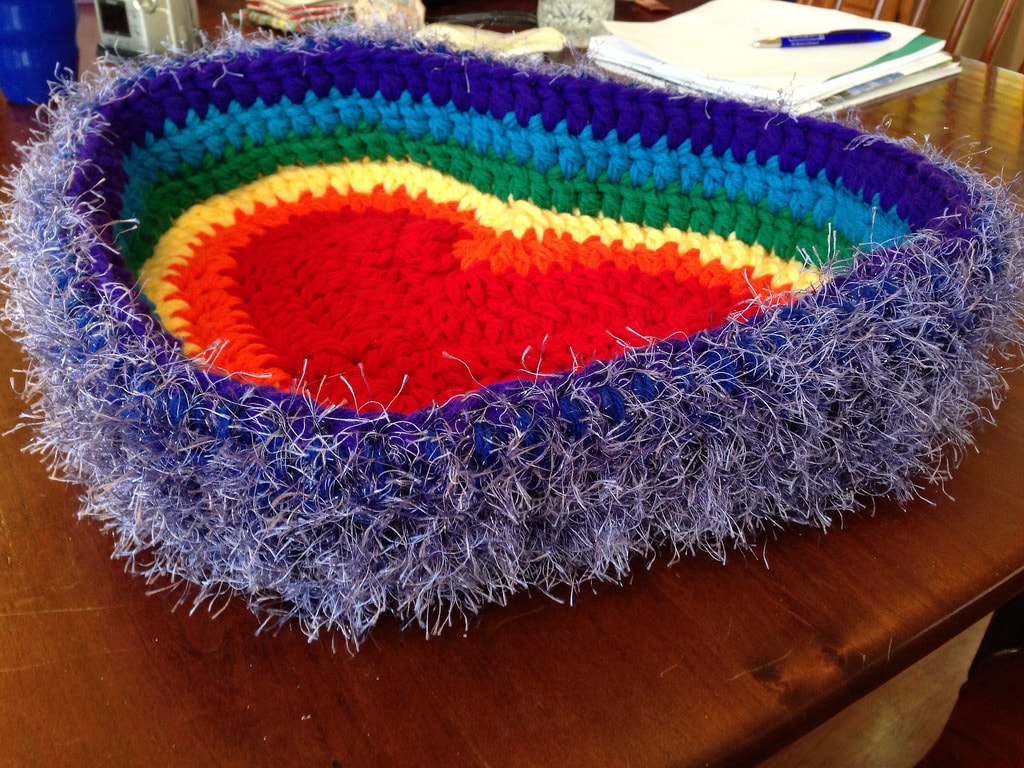
| Skill Level: | Moderate |
| Materials: | Wool |
| Tools: |
Crochet hooks, scissors, embroidery needle
|
The rainbow heart cat bed is colorful, comfy, and fluffy. It takes a little extra work because you need to swap wool after every row if you want to achieve that same layered heart design. But, alternatively, you can use a single color of wool to reduce the crochet time and make the plan a little easier to follow.
13. Cat Cave
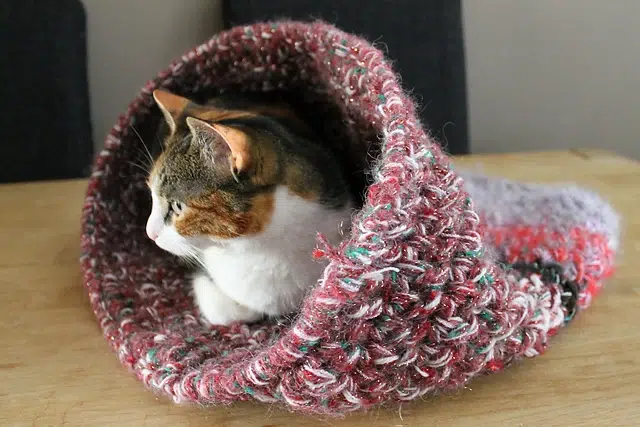
| Skill Level: | Moderate |
| Materials: | Wool |
| Tools: |
Crochet hooks, scissors, embroidery needle
|
If your cat is the type that loves to sleep inside a sock or other item of clothing, part of the reason may be that it likes the smell of you or the additional warmth that comes from being completely covered in fabric. This cat cave looks more like a giant sock and is ideal for those felines that do like that enclosed sleeping position. However, the plan is somewhat difficult to follow because it is just a series of photos and not a line-by-line guide. It is great for inspiration, though.
14. Kitten Ears Pet Bed
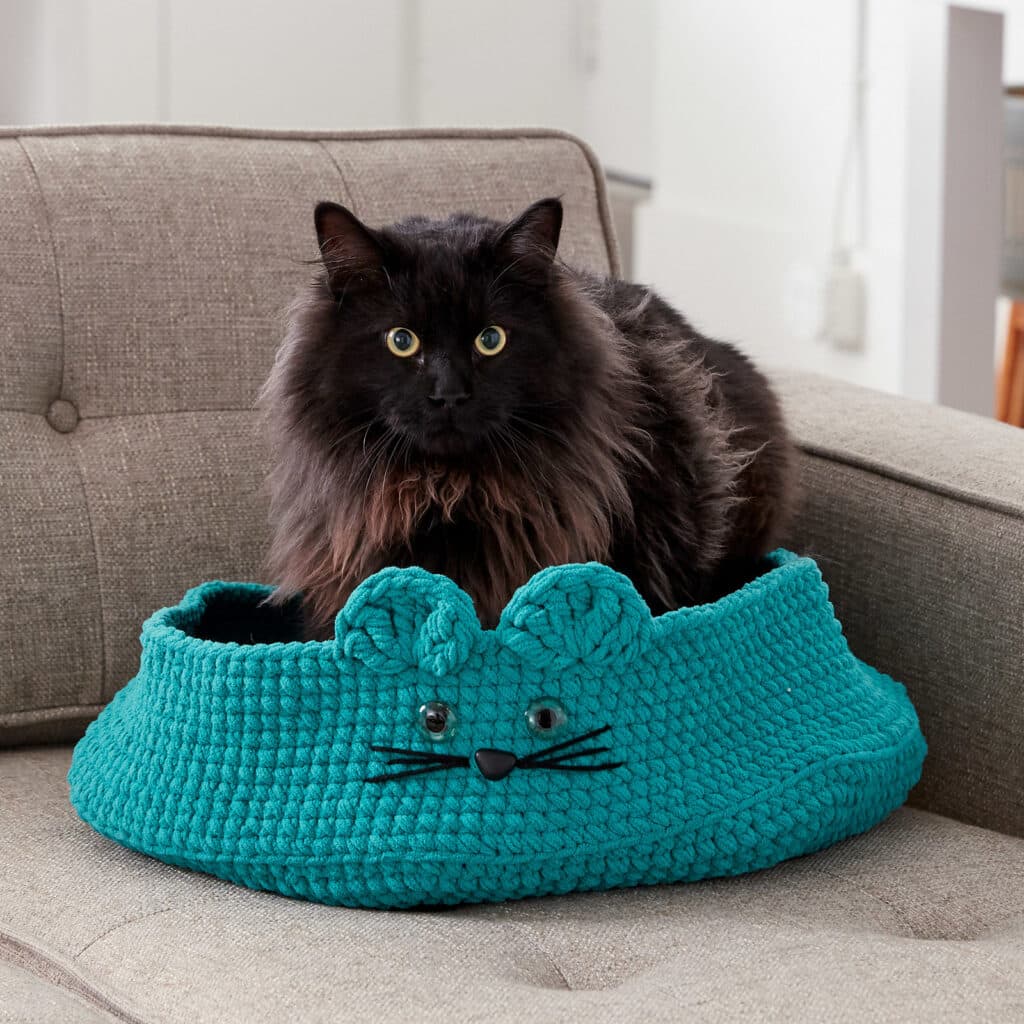
| Skill Level: | Easy |
| Materials: | Wool, safety eyes, fabric nose |
| Tools: |
Crochet hooks, scissors, embroidery needle
|
The kitten ears pet bed is essentially a standard crocheted cat bed, but the addition of safety eyes and nose takes it up a level and just those little details really make the cat bed stand out. The pattern suggests using probiotic wool because it reduces pet odors, which obviously can gather in a cat bed.
15. Curl-Up Kitty Cat Bed
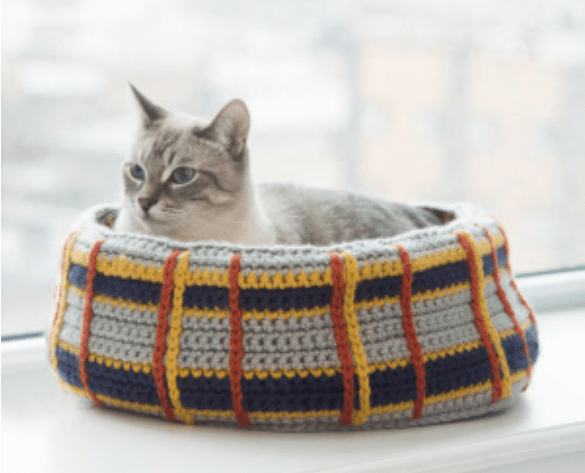
| Skill Level: | Easy |
| Materials: | Wool |
| Tools: |
Crochet hook, scissors, embroidery needle
|
The curl-up kitty cat bed uses a few different wool colors to give it an aesthetically pleasing design. The finish looks as though it is inspired by a traditional wicker cat bed but also has a tartan look to it. The bed itself is cozy and should provide ample resting opportunities for your cat.
16. Crochet House for Your Cat
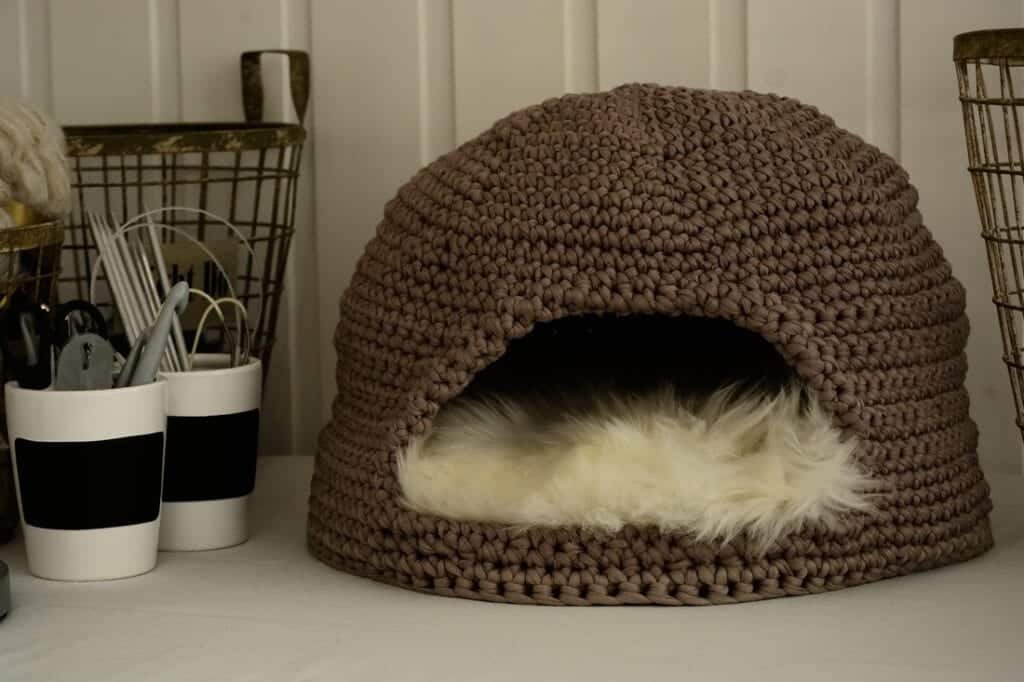
| Skill Level: | Easy |
| Materials: | Wool |
| Tools: |
Crochet hook, scissors, embroidery needle
|
This crochet house for your cat is easy to make and its construction means that it will stand up a little more than some of the pillow slip-style beds. Although if your cat tries to sit on top, it will still have no chance!
17. Cat Bed Crochet Pattern
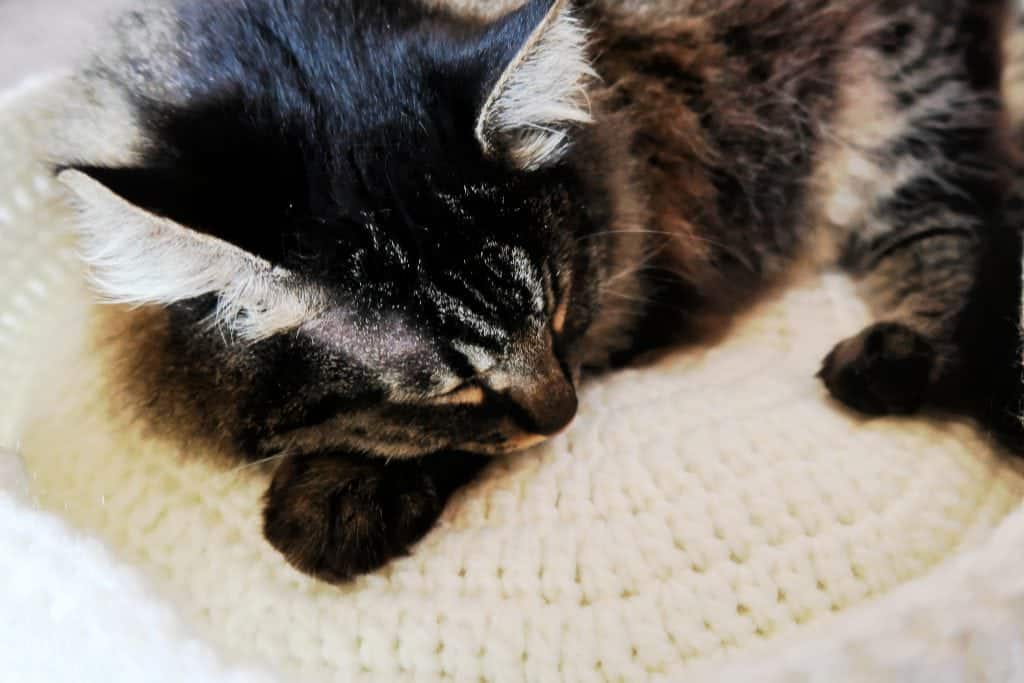
| Skill Level: | Easy/Moderate |
| Materials: | Wool, thread, buttons |
| Tools: |
Crochet hook, scissors, embroidery needle, needle
|
This cat bed crochet pattern has a double base and it requires the crocheting of the side panel separately before closing off the side panel loop using sewn-on buttons. The buttons make an attractive feature and because the sides are separate pieces from the base, the whole thing stands a little more upright than some of the other awesome cat beds on this list.
18. Red Heart Crochet Kitty Couch O’Go
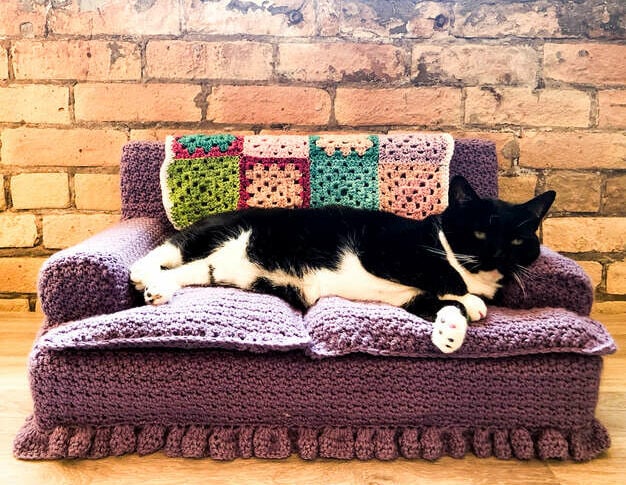
| Skill Level: | Moderate |
| Materials: | Wool, foam, glue sticks |
| Tools: |
Crochet hook, scissors, embroidery needle, glue gun
|
The red heart crochet kitty couch o’go is a unique-looking cat bed that is ideal for cats that like to steal your spot on the couch as soon as you stand up. There are a lot of pieces that need crocheting, and there is also some gluing involved to make this piece, but if you have the patience, the end result is worth the effort.
19. Crochet Cat Mat
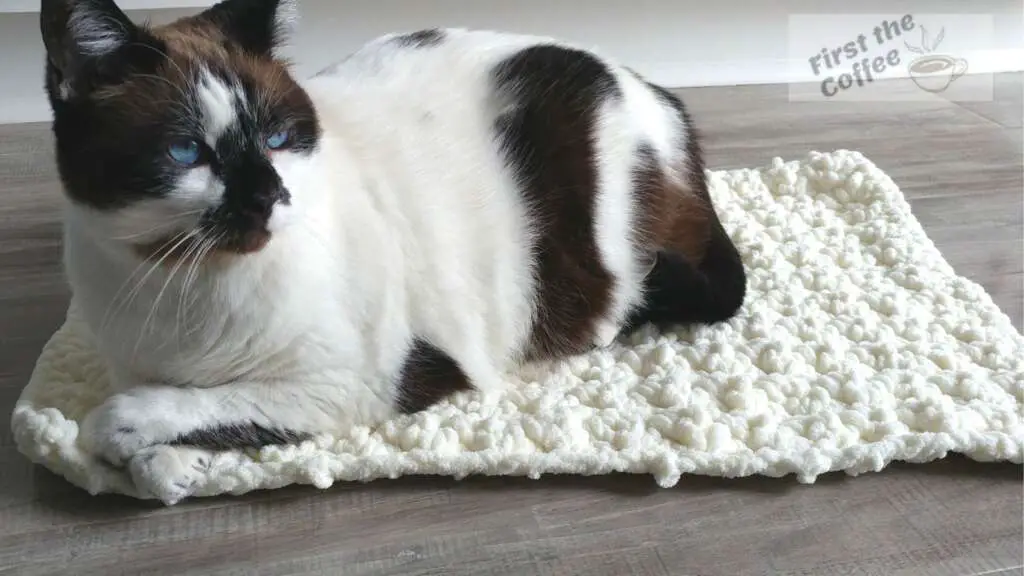
| Skill Level: | Easy |
| Materials: | Wool |
| Tools: |
Crochet hook, scissors, embroidery needle
|
There are some cats that love to sit on pieces of paper, laptops, and just about any other item you put on the ground. If your cat is one of these, then it may want nothing more than a comfortable mat to lay on. The crochet cat mat is warmer than a piece of paper but has a similar shape to it. It’s easy to crochet and comfortable for your feline.
Conclusion
There you have it—19 incredible DIY crochet cat bed patterns. We have no doubt that you will find the perfect one for your feline friend on this list. So bust out your crochet hook, your favorite yarn, and get to crafting!
Featured Image Credit: Suakabkaew Tiger, Shutterstock
Contents
- The 19 DIY Crochet Cat Beds
- 1. Classic Cat Bed
- 2. Modern Cat Bed
- 3. Tabby Chic Cat Bed
- 4. Animal Shelter Kitty Blanket
- 5. Crochet Cat Sack Hideaway
- 6. Bernat Cat Nap Nest
- 7. Skein Pet Bed
- 8. Crocheted Cat Nest
- 9. Psy and Thai’s Kitty
- 10. Cat House
- 11. Easy Crochet Cat Bed
- 12. Rainbow Heart Cat Bed
- 13. Cat Cave
- 14. Kitten Ears Pet Bed
- 15. Curl-Up Kitty Cat Bed
- 16. Crochet House for Your Cat
- 17. Cat Bed Crochet Pattern
- 18. Red Heart Crochet Kitty Couch O’Go
- 19. Crochet Cat Mat
- Conclusion

